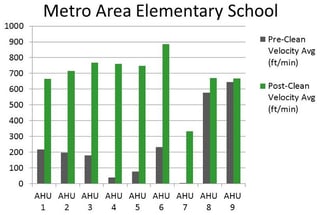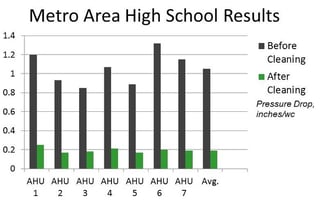Or, “Beat the summer heat without losing your shirt!”
Here in the Midwest we are entering the summer season with hot and humid weather expected for the next few months. During this time, the cost of cooling buildings goes up considerably. High temperatures and high humidity combine to increase the energy used by cooling equipment.
Beyond typical and low or no-cost energy saving measures you should already be doing (see “HVAC Gains with No Budget Pains”), here are three ways to reduce the potential for wasting energy in commercial and industrial buildings. Most people don’t usually consider these, but they can make a huge difference.
- Cleaning Cooling Coils. We talk with our clients a lot about coil cleaning. Mostly because we find that most building owners and managers have never looked at their coils or considered the need to clean them! Over time, bacteria grow in and on cooling coils. This reduces system efficiency, and can create odors or even lead to health issues. See Slime and Dirty Socks – How Do They Help You Save Energy and Improve IAQ?

Conventional coil cleaning helps, but for best results, we recommend cleaning with high pressure steam using an engineered, chemical-free process. Using such a method, one Detroit area school saw an increase in the average air handling unit velocity (ft/min across the coil) of more than 1200% for the 9 units serviced. If that seems extraordinarily high, it is. Many of the units had been speeded up over the years to overcome the additional resistance built up in the coils as they got dirtier and dirtier. After cleaning, the school was able to return them to the approximately 500 ft/min velocity across the coil for which the units had been designed. By slowing down the fans to accomplish this, the fan motors used significantly less energy.
 In another school, the average coil pressure differential was reduced 80%, and the average CFM increased 40%.
In another school, the average coil pressure differential was reduced 80%, and the average CFM increased 40%.
When coils get dirty, heat transfer is also reduced - considerably. The compressors in a rooftop unit, or the chillers in a larger system, must work harder and longer, thus using more energy, to deliver the same amount of cooling capacity to the now (dirty and) inefficient cooling coils. - Optimizing start and stop times of air handling systems. Is your system running all night when no one is in the building? Does it come on too early or stay on longer than needed? If you start the system at 6 a.m., but most people arrive between 8 and 9, think about starting the system at 7 a.m. or even later.
What time does the HVAC system turn off? Could you turn off the compressors or chillers an hour or so before people leave for the day but leave the fans on until everyone is gone? People generally won’t notice if the temp goes up minimally just before they leave.
Let’s say you own a 100,000 sq. ft. office building that’s open on a typical 9-to-5 schedule and requires 250 tons of cooling. Depending where you are in the country, think about how much you could save by implementing this simple, low-cost strategy.
- Window Film. It is estimated that, in many buildings, 28% of cooling expenses are due to solar heat gain from windows, and a building can save up to one ton of air conditioning for every 100 square feet of exposed glass.
Unlike biofilm on coils, tinted window film has purpose. Have you thought about using window film to reduce the cooling load on south and west exposures? Your results may vary, but according a local window film provider, they helped a large office building cover 3,083 windows and save an estimated $57,000/yr.
Window film has a relatively fast payback – approximately three years, and it helps minimize the heating load in the cold weather resulting in year-round savings as well as additional occupant comfort.
The key to successfully lowering your summer utility bills is to not just think about, but implement these concepts. They are not difficult to do, but have the potential for the building owner to reap large monetary savings. Certainly they can improve the indoor air quality and people’s comfort, improving productivity without losing your shirt!



